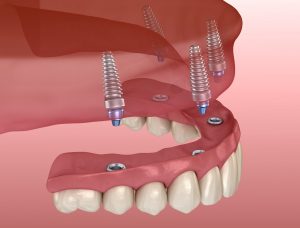
Dental implants in Allen are a remarkable solution to missing teeth because they do more than replace the visible portion of teeth. They also replace the tooth roots, which means that they support the jawbone and provide an outstanding bite force. However, you may still wonder, since natural teeth each have their own root, does that mean you need a dental implant to replace each lost tooth? No. Let’s talk about how many teeth can be replaced by one, two, or more dental implants.
One Dental Implant
If you are missing just one tooth, your dentist in Allen will place a single implant into the jawbone. After the implant has bonded with the tissue around it, you will receive a crown to replace the top portion of the lost tooth.
A single dental implant can also be used to replace two adjacent teeth. Once the implant has bonded with the body, your dentist will place a two-unit restoration top of it. One unit will be a crown, and the other unit will be a pontic (an artificial tooth that is attached to the crown).
Two Dental Implants
If you are missing three or more teeth in a row, you may need as few as two dental implants to replace all of them. Your dentist can place one implant at each end of the gap. The implants will support crowns, and the crowns will support 1 – 3 pontics between them. Thus, in total, two dental implants can replace up to five teeth.
Four or More Dental Implants
If you have lost all of your teeth throughout an arch, it might be possible to replace them with as few as four dental implants. That is possible thanks to a special procedure known as All-on-4. A highly trained dentist inserts the implants at strategic locations in the jaw. Two go toward the front of the mouth, and two are placed at an angle toward the back of the mouth, in places where the bone is naturally strong and thick. This precise placement allows for the placement surgery to be as minimally invasive as possible while still providing strong support for the restoration that will go on top of the implants.
Some patients are not candidates for All-on-4, or they would prefer that their new teeth have even more support than what four implants might provide. In such cases, the dentist may insert six or more implants at various locations throughout the jawbone.
No matter how many teeth you are missing, dental implants might be the ideal treatment for you! A local implant dentist will be happy to talk to you about how you can regain a mouth full of strong, fully functional teeth.
About the Author
Dr. Keyvan Kar is a prosthodontist and general dentist in Allen. His advanced training equips him to perform a broad range of implant procedures, including single tooth replacement, implant-supported bridges, and All-on-4. To learn more about Dr. Kar and how he may be able to help you rebuild your smile, contact our office at 214-260-9911.
